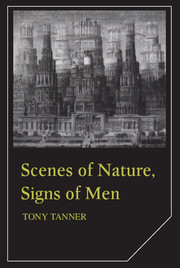Book contents
- Frontmatter
- Contents
- Preface
- 1 Scenes of nature, signs of men
- 2 Notes for a comparison between American and European Romanticism
- 3 Problems and roles of the American artist as portrayed by the American novelist
- 4 James on Hawthorne
- 5 The lost America – the despair of Henry Adams and Mark Twain
- 6 Henry James and Henry Adams
- 7 William Dean Howells and A Hazard of New Fortunes
- 8 Stephen Crane
- 9 The Bostonians and the human voice
- 10 Games American writers play: ceremony, complicity, contestation, and carnival
- 11 Toward an ultimate topography: the work of Joseph McElroy
- 12 Frames and sentences
- 13 William Gass's barns and bees
- Index
6 - Henry James and Henry Adams
Published online by Cambridge University Press: 01 June 2011
- Frontmatter
- Contents
- Preface
- 1 Scenes of nature, signs of men
- 2 Notes for a comparison between American and European Romanticism
- 3 Problems and roles of the American artist as portrayed by the American novelist
- 4 James on Hawthorne
- 5 The lost America – the despair of Henry Adams and Mark Twain
- 6 Henry James and Henry Adams
- 7 William Dean Howells and A Hazard of New Fortunes
- 8 Stephen Crane
- 9 The Bostonians and the human voice
- 10 Games American writers play: ceremony, complicity, contestation, and carnival
- 11 Toward an ultimate topography: the work of Joseph McElroy
- 12 Frames and sentences
- 13 William Gass's barns and bees
- Index
Summary
When Henry James sent Henry Adams a copy of Notes of a Son and Brother (the second volume of what is now referred to as his Autobiographies – the others being A Small Boy and Others and The Middle Years), Adams's response was rather extraordinary. The reminiscence, he wrote to Mrs Cameron, had reduced him to a pulp. Why idealize all that past life in a vanished nineteenth-century America, he wanted to know. ‘Why did we live? Was that all? Why was I not born in Central Africa and died young? Poor Henry James thinks it all real, I believe, and actually still lives in that dreamy, stuffy Newport and Cambridge, with papa James and Charles Norton – and me! Yet, why?’ To James himself he wrote what we can only infer was one of his pessimistic and melancholy outbursts. His letter is lost but we have James's marvellous reply, from which I want to quote at some length, if only to convey a sense of the rare poise in his tone.
My dear Henry,
I have your melancholy outpouring of the 7th, and I know not how better to acknowledge it than by the full recognition of its unmitigated blackness. Of course we are lone survivors, of course the past that was our lives is at the bottom of the abyss – if the abyss has any bottom; of course, too, there's no use talking unless one particularly wants to. […]
- Type
- Chapter
- Information
- Scenes of Nature, Signs of MenEssays on 19th and 20th Century American Literature, pp. 94 - 110Publisher: Cambridge University PressPrint publication year: 1987

